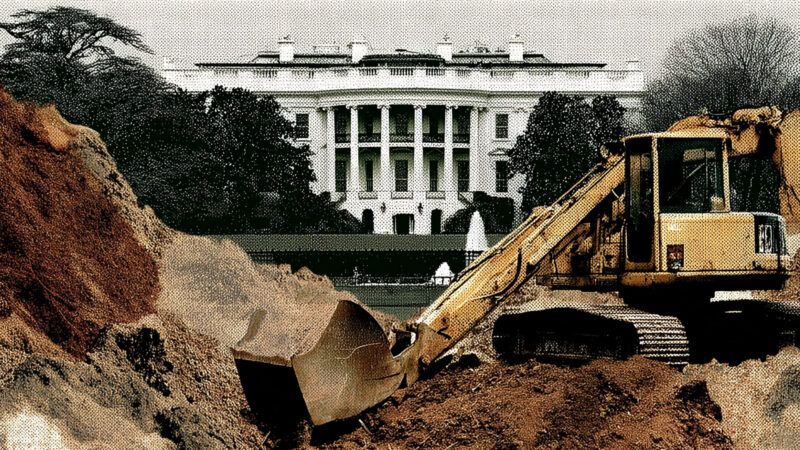The White House Thinks Taking Partial Ownership of a Canadian Mining Company Will Reduce the National Debt
Trump's deal with a lithium mine in Nevada follows similar "creative deals" with Intel and U.S. Steel.

Since being reelected, President Donald Trump has falsely claimed his tariffs will reduce the national debt. Trump is now taking this marketing pitch to sell another one of his economic policies: government ownership in private companies.
On Wednesday, the Energy Department announced that the government will be taking a 5 percent stake in Canadian mining firm Lithium Americas and a 5 percent stake in Thacker Pass, the company's lithium mining project in Nevada. This equity stake builds on a $2.26 billion loan from the Biden administration Energy Department to the company last year to "help finance the construction of facilities for manufacturing lithium carbonate" at Thacker Pass, which has the largest confirmed lithium reserves in North America. The deal, according to Energy Secretary Chris Wright, will ensure "better stewardship of American taxpayer dollars."
The White House has taken this messaging further. "This is a creative solution by the president of the United States to tackle our nation's crippling debt crisis," White House press secretary Karoline Leavitt said on Wednesday. "The president is focused on how can the United States government make more money, how can we make our country wealthy and rich again? Cutting some of these unique, creative deals with companies around the world and here at home is just one way that the president is seeking to do that."
These types of "creative deals" have become a hallmark of the second Trump administration. Since Trump's return to the White House, the federal government has taken a "golden share" of U.S. Steel, granted export licenses to American chipmakers in exchange for a cut of the revenue generated from their sales, and, more recently, became the largest shareholder of Intel by taking a 10 percent stake in the company (worth about $9 billion at the time of acquisition and $17 billion today).
The deals have been justified as a way to protect America's economic and national security interests, and the Lithium Americas announcement is no different. "It's in America's best interest to get that mine built," Wright told Bloomberg. "Lithium Americas needs to raise some more capital so the mine is financially sound….We're leaning in with a large amount of debt capital, so it's just a more commercial transaction."
Like the other government stakes before it, the economic justification for this deal is flimsy. At the time of the initial Energy Department loan in 2024, global lithium demand was experiencing unprecedented growth, which has continued and is expected to continue as the use of semiconductors, electric vehicles, and renewable energy sources becomes ubiquitous. With the mine expected to produce 400,000 metric tons of battery-grade lithium carbonate each year and generate over $2 billion in revenue (according to a January estimate), there is no reason why taxpayers need to finance a project that the market seems to think will be profitable.
The White House's argument that this will tackle the "crippling debt crisis" could be even flimsier. Scott Lincicome, vice president of general economics at the Cato Institute, tells Reason that taking a 5 percent stake in a $2 billion project is a "rounding error for our debt problem." The national debt currently stands at over $30 trillion held by the public. Lincicome points out that "the only way to get money back is by selling the stake, which [the Energy Department] doesn't plan on doing." At the end of the day, he adds, this deal has less to do with addressing the national debt and "everything to do with exercising more control over private businesses."
The White House has made several questionable claims to justify Trump's takeover of the economy. Arguing that a government stake in an already federally backed project will shrink the national debt could be its weakest argument yet.


Show Comments (70)